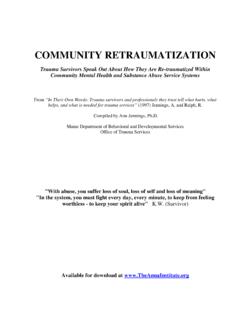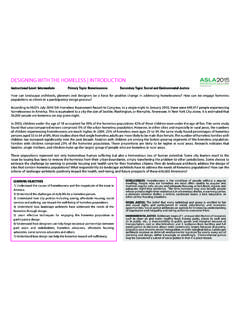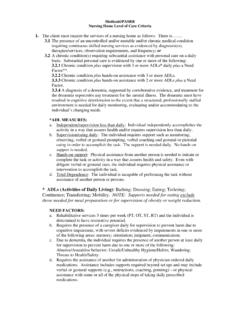Transcription of Accommodating Substance Misusers
1 AccommodatingSubstance MisusersThe Spectrum of Possibility A Guide for Housing ProvidersContext and PurposeThe Cycle of ChangeThe Spectrum of Support High Tolerance Some Tolerance Limited Tolerence Rare ToleranceIndependenceWhole Systems Approach Specialist ProjectsAppendix: Drug Policy Guidance Introduction Procedures for Staff Drugs Policy 1 - High Tolerance Drugs Policy 2 - Some Tolerance Drugs Policy 3 - Limited Tolerance Drugs Policy 4 - Rare Tolerance Relevant LegislationAccommodating Drug/Alcohol Users A Guide for Housing Providers Contents135678910111113141923273134 Accommodating Drug/Alcohol Users A Guide for Housing Providers 21 Accommodating Drug/Alcohol Users A Guide for Housing Providers Context and PurposeNorfolk Drug and Alcohol Partnership recognise the need to respond to the issue of housing people with drug/alcohol problems.
2 It also recognises that it is a complex problem with a wide spectrum of possible responses. Homeless people often have drug/alcohol problems. Crisis research with homeless people (2003) noted that 51% had alcohol problems and 57% had drug problems. The challenge facing agencies providing supported housing is that many people in need of their help are likely to be using guide has been developed for providers and commissioners of supported housing services as a framework to use when thinking through the delivery of housing for people with drug/alcohol problems. It also provides benchmarks against which providers working across a broad spectrum can compare themselves. Its ultimate aim is to support housing providers and commissioners looking to make their contribution to increasingly successful outcomes for people with drug/alcohol problems, their families and the wider community.
3 Drug legislation is not a barrier to providing accommodation to people with drug/alcohol problems. Confusion about the law and fear about dealing with issues can be, and problems can result. Under Section 8 of the Misuse of Drugs Act 1971, supported housing providers have a legal duty to prevent the manufacture and supply of controlled drugs on their premises and its environs. They also have a duty to prevent the smoking of cannabis and prepared opium, in addition to duties linked to recent legislation pertaining to Crack House Closure Orders. However, at present there is no legal duty for supported housing providers to prevent the possession of drugs or the use of drugs per se, with the noted cannabis and prepared opium exception outlined above. Attempts in recent years to update Section 8 of the Misuse of Drugs Act were abandoned in the light of a range of concerns raised by housing providers and frontline drug workers among others, but legislation is only one aspect of this difficult issue.
4 Housing providers also have to consider their duties of care to service users and staff - and this means robust policies backed with staff training. Primary actions to ensure supported housing maintain their duties and protect people need not be contacting the police or eviction - though this can become at any stage of recovery from Substance misuse need appropriate accommodation. Service users need the right support in the right environment at the right time. In practical terms, this means there will be times when some schemes are providing accommodation for people who will be using drugs/alcohol, even, on occasion, those schemes that aim to provide a safe house environment where people are abstinent. Staff need the right skills and support to manage all tolerance as a blanket policy in all types of supported housing would not take into account the day-to-day realities of the lives of service users who will be at different stages in the Cycle of Change which is looked at in detail later on.
5 Nor would it give providers the range of options they need to manage matters within the confines of their scheme. Accommodating Drug/Alcohol Users A Guide for Housing Providers 2 Many commentators regard blanket zero tolerance policies across the spectrum of accommodation provision as unworkable, fearing that it encourages people to hide drug/alcohol problems, giving a false sense of security to staff and service users and posing risks for all. This is a difficult area requiring us to strike the right balance between agency policy, operational practice and criminal law. This guide aims to help providers and commissioners find that balance, within the context of: the Cycle of Change the Spectrum of Support the Whole Systems ApproachFor the purpose of the guide, a definition of someone who has problems with drugs/alcohol is taken as: Any person who experiences or causes social, psychological, physical or legal problems relating to their self-administration of drugs and/or alcohol.
6 Finally, the appendix contains sample drugs policies, guidance for staff and reference to relevant legislation and useful Drug/Alcohol Users A Guide for Housing Providers 43 Accommodating Drug/Alcohol Users A Guide for Housing Providers Pre-contemplationContemplationDecisionor preparationActionMaintenanceRelapseor setbackInOutThe Cycle of ChangeThe Cycle of Change model, developed by Prochaska and DiClemente1, takes into account the fact that people with drug/alcohol problems go through specific stages of change. These stages must be understood in order for housing to be appropriate. People do not always go through these stages smoothly and can shift rapidly from one to another. Many people go through them several times. Pre-contemplators - Those not thinking about changeIf someone has not thought about changing, the support emphasis has to be around harm reduction and perhaps building trust.
7 Interventions are likely to be brief and focussed on practical tasks such as finding/maintaining housing rather than interventions around Substance - Those ambivalent about changeWork for someone contemplating change focuses on weighing up the pros and cons of changing. Workers will promote choices and possibilities without suggesting plans. In Decision - Those preparing to changeWork will focus on establishing goals, remaining realistic and identifying Action - Those making a changeWork is varied during this stage. Clear advice can be offered, referrals made and progress monitored. Workers remain positive and Maintenance - Those having made a changeIn this stage, work is focused on relapse prevention and establishing wider support networks. Feedback about achievements is Drug/Alcohol Users A Guide for Housing Providers 43 Accommodating Drug/Alcohol Users A Guide for Housing Providers In Relapse - Those who have had a setbackIn relapse there must be rapid response and reaffirming support/achievements.
8 Workers remain positive and assess whether the person can return to maintenance rapidly or whether they are going through the cycle right intervention at the right stage is crucial. If someone is in pre-contemplation trying to make plans to change behaviour is a waste of time. If someone in decision stage is not given options they could easily fall back into contemplation stage .1 Prochaska J, DiClemente CC. The transtheoretical approach: crossing traditional boundaries of therapy. Homewood Illinois: Dow Jones-Irwin; Accommodating Drug/Alcohol Users A Guide for Housing Providers The Spectrum of SupportThis is based on the premise that people are in different stages of change and require different interventions. This needs to be reflected in their supported housing too. A sensible spectrum of support ethos and drug policy is required that meets needs. A person s recovery from drug/alcohol misuse/dependency and ability to learn to live independently is impaired without a staged approach reflecting the needs of the Tolerance drug free possibilityeg Assessment or Resettlement Projectsrules on drink?
9 Sharps bins? class A meds?Limited Tolerance drug free objectiveeg Post-Detox Accommodation or Safe Houserelapse support? specialists?High Tolerance drug free unlikelyeg Harm Reduction Scheme or Wet Houseno pressure to change? (no cannabis)Rare Tolerance drug free imperativeeg Therapeutic Community or Residential Rehabstrong sanctions?EthosThis housing type understands that some people will continue to use drugs/alcohol on the premises. It works with this fact to ensure harm to the individual is reduced and the public is put at less risk. Who is it for?It is for people who have made many attempts to change their drug/alcohol use but have not been able to. They are likely to be dependent on alcohol or class A drugs. They probably have a range of other issues too (eg mental illness, learning difficulties). What kind of housing? This housing requires high levels of support (24/7).
10 It is likely to be registered care or nursing and highly specialist. It will require support from clinical services. It is likely to be specially commissioned services (eg dual diagnosis). Legal considerationsKnowledge of the law and support from local police will be of paramount importance. This housing type will need to demonstrate that they are preventing cannabis (and opium) smoking and all drug dealing, but will not need to prevent the use of other drugs. They will need to know how to legally dispose of any drugs found on the detailed drug/alcohol policy will be required. Its aim will be for the project to be as flexible as possible whilst working within the law. It will not aim to evict anyone for the use of drugs or alcohol (exception: cannabis/opium). There will be sanctions for of ChangePre-contemplation: those not thinking about change. InterventionsDo assess needs/risk, limit damage, build trust and therapeutic relationship, provide health t persuade, be critical or Tolerance drug free unlikelyeg Harm Reduction Scheme or Wet Houseno pressure to change?








